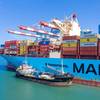Valaris Jack-up Using AI for Man Overboard Detection
A Valaris jack-up drilling rig is using an AI-enabled intelligent detection and tracking solution to provide automated person overboard detection and alerts, marking the first time the cutting-edge technology has been deployed in the offshore oil and gas sector.
Zelim's ZOE software was installed on board the Valaris Stavanger in February after the Edinburgh-based technology company worked with the drilling contractor to customize the solution for the specific requirements of jack-up vessels. Following an initial trial period, Valaris will evaluate the suitability of the system for use on other assets in its fleet.
Glen Spearman, Offshore Installation Manager onboard VALARIS Stavanger, said, “The North Sea is a harsh weather environment that can change quickly. If someone ends up in the water, the alarm is raised and one person acts as a spotter to maintain visual contact. We are totally reliant on line of sight. ZOE gives us a 360-degree view from the rig at any one time. It could reduce our response time and improve the chances of successful rescue in the event of a person overboard.”
According to Zelim, the first challenge with a person overboard is knowing when and where the person fell. The second is finding them once they have entered the water. Even once theperson is located, they can drift quickly and be obscured by waves, light glare and sea spray. The risk of losing sight of them is high. Standard person overboard procedures are fully reliant on the human eye to locate and maintain sight of the individual, a difficult task which is further impeded in darkness and heavy weather. With seven infrared and optical cameras placed around the vessel, ZOE is constantly on watch – around the entire rig and around the clock, Zelim said.
Doug Lothian, Chief Technology Officer at Zelim, said, “ZOE has been designed and developed in collaboration with the U.S. Coast Guard. The system has been through extensive testing in adverse conditions and given a 96.8% successful detection rate up to 337 meters, which is above and beyond standard requirements. Valaris was involved with us on this project with hands-on experience of their work environment, which meant we quickly understood their specific customization requirements.”
In the incidence of a person overboard, ZOE transmits an automatic alert to the radio operator, who can see a 10-second clip of when the alert was triggered whilst simultaneously viewing live footage, Zelim said. ZOE continues to track the person in the water, thereby increasing their chances of successful rescue. The system logs the position of the vessel and the person overboard at the point of detection for mayday call geo-location, as well as providing the radio operator with a mayday script and actions checklist, ensuring fast and accurate reporting under stressful circumstances.
Data from ZOE is processed onboard the vessel for security and full functionality with no internet connection. The system’s AI models have been built on a dataset of over 4.9 million labeled maritime rescue images across a wide range of ocean conditions. Zelim said the technology is highly extensible, with other potential uses including automatic security threat detection and alerting as well as red zone monitoring.







